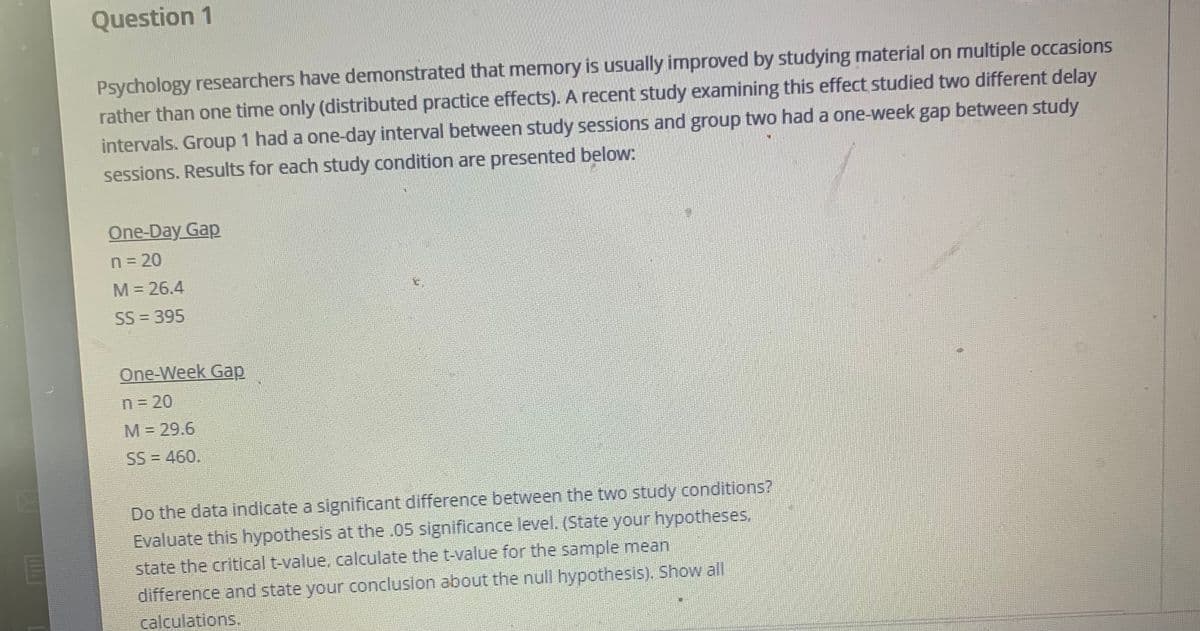Psychology researchers have demonstrated that memory is usually improved by studying material on multiple occasions rather than one time only (distributed practice effects). A recent study examining this effect studied two different delay intervals. Group 1 had a one-day interval between study sessions and group two had a one-week gap between study sessions. Results for each study condition are presented below: One-Day Gap n= 20 M = 26.4 SS = 395 One-Week Gap n = 20 M = 29.6 SS = 460. Do the data indicate a significant difference between the two study conditions? Evaluate this hypothesis at the .05 significance level. (State your hypotheses, state the critical t-value, calculate the t-value for the sample mean difference and state your conclusion about the null hypothesis). Show all calculations
Psychology researchers have demonstrated that memory is usually improved by studying material on multiple occasions rather than one time only (distributed practice effects). A recent study examining this effect studied two different delay intervals. Group 1 had a one-day interval between study sessions and group two had a one-week gap between study sessions. Results for each study condition are presented below: One-Day Gap n= 20 M = 26.4 SS = 395 One-Week Gap n = 20 M = 29.6 SS = 460. Do the data indicate a significant difference between the two study conditions? Evaluate this hypothesis at the .05 significance level. (State your hypotheses, state the critical t-value, calculate the t-value for the sample mean difference and state your conclusion about the null hypothesis). Show all calculations
College Algebra
7th Edition
ISBN:9781305115545
Author:James Stewart, Lothar Redlin, Saleem Watson
Publisher:James Stewart, Lothar Redlin, Saleem Watson
Chapter1: Equations And Graphs
Section: Chapter Questions
Problem 10T: Olympic Pole Vault The graph in Figure 7 indicates that in recent years the winning Olympic men’s...
Related questions
Question

Transcribed Image Text:Question 1
Psychology researchers have demonstrated that memory is usually improved by studying material on multiple occasions
rather than one time only (distributed practice effects). A recent study examining this effect studied two different delay
intervals. Group 1 had a one-day interval between study sessions and group two had a one-week gap between study
sessions. Results for each study condition are presented below:
One-Day Gap
n= 20
M = 26.4
SS = 395
One-Week Gap
n= 20
M = 29.6
SS = 460.
Do the data indicate a significant difference between the two study conditions?
Evaluate this hypothesis at the .05 significance level. (State your hypotheses.
state the critical t-value, calculate the t-value for the sample mean
difference and state your conclusion about the null hypothesis). Show all
calculations.
EM
Expert Solution
This question has been solved!
Explore an expertly crafted, step-by-step solution for a thorough understanding of key concepts.
This is a popular solution!
Trending now
This is a popular solution!
Step by step
Solved in 3 steps with 10 images

Knowledge Booster
Learn more about
Need a deep-dive on the concept behind this application? Look no further. Learn more about this topic, statistics and related others by exploring similar questions and additional content below.Recommended textbooks for you

College Algebra
Algebra
ISBN:
9781305115545
Author:
James Stewart, Lothar Redlin, Saleem Watson
Publisher:
Cengage Learning

Linear Algebra: A Modern Introduction
Algebra
ISBN:
9781285463247
Author:
David Poole
Publisher:
Cengage Learning

Functions and Change: A Modeling Approach to Coll…
Algebra
ISBN:
9781337111348
Author:
Bruce Crauder, Benny Evans, Alan Noell
Publisher:
Cengage Learning

College Algebra
Algebra
ISBN:
9781305115545
Author:
James Stewart, Lothar Redlin, Saleem Watson
Publisher:
Cengage Learning

Linear Algebra: A Modern Introduction
Algebra
ISBN:
9781285463247
Author:
David Poole
Publisher:
Cengage Learning

Functions and Change: A Modeling Approach to Coll…
Algebra
ISBN:
9781337111348
Author:
Bruce Crauder, Benny Evans, Alan Noell
Publisher:
Cengage Learning

Trigonometry (MindTap Course List)
Trigonometry
ISBN:
9781337278461
Author:
Ron Larson
Publisher:
Cengage Learning
